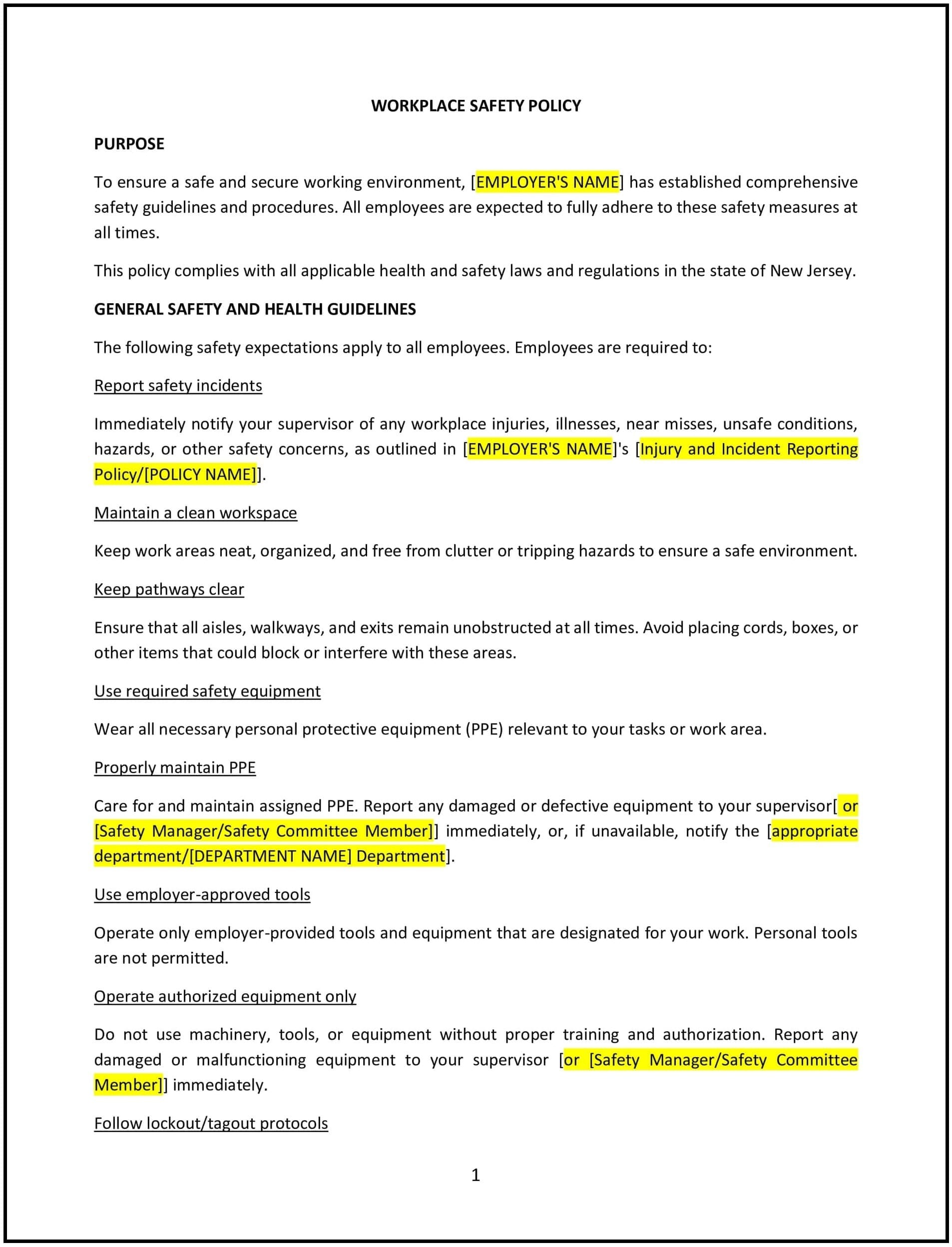Workplace safety policy (New Jersey): Free template
Got contracts to review? While you're here for policies, let Cobrief make contract review effortless—start your free review now.

Customize this template for free
Workplace safety policy (New Jersey)
A workplace safety policy helps New Jersey businesses establish guidelines to protect employees from injury, illness, or harm while performing their job duties. This policy outlines the responsibilities of both the employer and employees in maintaining a safe work environment, including hazard identification, safety training, reporting procedures, and emergency protocols.
By adopting this policy, businesses in New Jersey can minimize the risk of workplace accidents, protect their employees' well-being, and comply with state regulations regarding health and safety standards.
How to use this workplace safety policy (New Jersey)
- Define safety responsibilities: Clearly outline the roles and responsibilities of both employees and employers in maintaining workplace safety, including the duty to report hazards, participate in training, and follow safety procedures.
- Identify common workplace hazards: List common safety hazards specific to the business’s industry and workplace, such as chemical exposure, machinery, or slip and fall risks, and outline the procedures for mitigating these risks.
- Establish reporting procedures: Provide employees with a clear process for reporting hazards or unsafe conditions, ensuring that issues are addressed promptly to prevent accidents or injuries.
- Implement safety training: Require all employees to participate in regular safety training that covers the proper use of equipment, emergency procedures, and health and safety regulations.
- Set emergency response protocols: Define emergency procedures for situations such as fires, medical emergencies, natural disasters, or workplace accidents. This should include evacuation plans, first-aid procedures, and who to contact in case of an emergency.
- Provide personal protective equipment (PPE): If necessary, outline the types of PPE required for employees to safely perform their job duties, such as helmets, gloves, or safety glasses.
- Encourage a safety culture: Foster a work culture where safety is a priority, encouraging employees to look out for one another and report unsafe behaviors or conditions.
- Review and update: Regularly review the policy to ensure it is aligned with New Jersey regulations and any changes in the business or workplace environment.
Benefits of using this workplace safety policy (New Jersey)
This policy provides several benefits for New Jersey businesses:
- Reduces accidents and injuries: Helps prevent workplace accidents by clearly defining safety procedures, ensuring employees are aware of potential hazards and how to avoid them.
- Improves employee well-being: Demonstrates the company’s commitment to creating a safe and healthy work environment, improving employee morale and reducing stress.
- Minimizes legal risks: Helps businesses comply with state and federal safety regulations, reducing the risk of legal claims or fines related to workplace accidents.
- Enhances business productivity: A safe workplace minimizes downtime caused by accidents and injuries, ensuring smooth and uninterrupted business operations.
- Boosts company reputation: Shows employees, clients, and customers that the company values their safety, contributing to a positive reputation and attracting top talent.
Tips for using this workplace safety policy (New Jersey)
- Communicate the policy clearly: Ensure that all employees understand the safety policy, their responsibilities, and the steps they should take to report hazards or unsafe conditions.
- Provide regular safety training: Offer ongoing training and refresher courses to ensure that employees remain up-to-date on the latest safety protocols and best practices.
- Make safety a priority: Encourage employees to actively participate in creating a safe workplace by identifying hazards, adhering to safety protocols, and using PPE.
- Regularly inspect the workplace: Conduct regular safety inspections to identify and address potential hazards, ensuring that the workplace remains safe.
- Review the policy regularly: Update the safety policy annually or whenever there are significant changes in New Jersey regulations, industry standards, or workplace conditions.